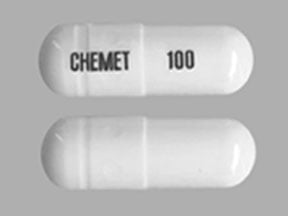
Chemet Coupons & Savings Card – Discount Prices from $2192.99
My prescription
Edit
100MG, Chemet (100 Capsules)
Select pharmacy

CVS
$2192.99
COUPON PRICE
Albertsons
$2230.58
COUPON PRICE
Walgreens
$2264.95
COUPON PRICE
Walmart
$2268.19
COUPON PRICEChemet savings card
Show this card to your pharmacist
CVS
$2192.99
BIN
ID
PCN
GRP
015995
LHKPV523063
GDC
DR33
Powered by
Price history for Chemet
100 Capsules, 100MG
Average retail price for Chemet
Average SaveHealth price for Chemet
Our price history data is based on aggregated prescription data collected from participating pharmacies in America. Our prescription data updates daily to reflect the latest price changes. If you notice a missing data point, it means there wasn't sufficient data available to generate a monetary value for that date.
*Retail prices are based on pharmacy claims data, and may not be accurate when we don't have enough claims.
Chemet dosage forms
Dosage Quantity Price from Per unit 100MG 100 Capsules $2250.95 $22.51
| Dosage | Quantity | Price from | Per unit |
|---|---|---|---|
| 100MG | 100 Capsules | $2250.95 | $22.51 |
What is Chemet used for?
Chemet is used for the treatment of lead poisoning in children. It helps to reduce blood lead levels by binding to the lead, allowing it to be excreted from the body.
How much does succimer cost?
The cost of succimer can vary depending on factors such as the pharmacy, location, and whether the patient has insurance coverage. It is recommended to check with local pharmacies for the most accurate and up-to-date pricing. Additionally, insurance plans may cover part of the cost, so consulting with the insurance provider can provide more information on potential out-of-pocket expenses.
Using the SaveHealth discount card, what is the price of Chemet without insurance?
Using the SaveHealth discount card, the price of Chemet without insurance is $2192.99.
What is the price of Chemet at CVS?
The price of Chemet at CVS is $2192.99.
What is the price of Chemet at Walgreens?
The price of Chemet at Walgreens is $2264.95.
What is the price of Chemet at Walmart?
The price of Chemet at Walmart is $2268.19.
